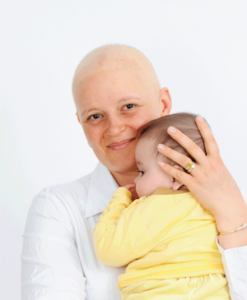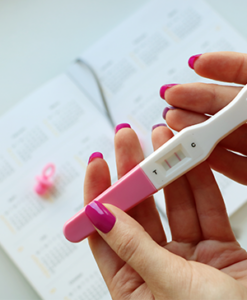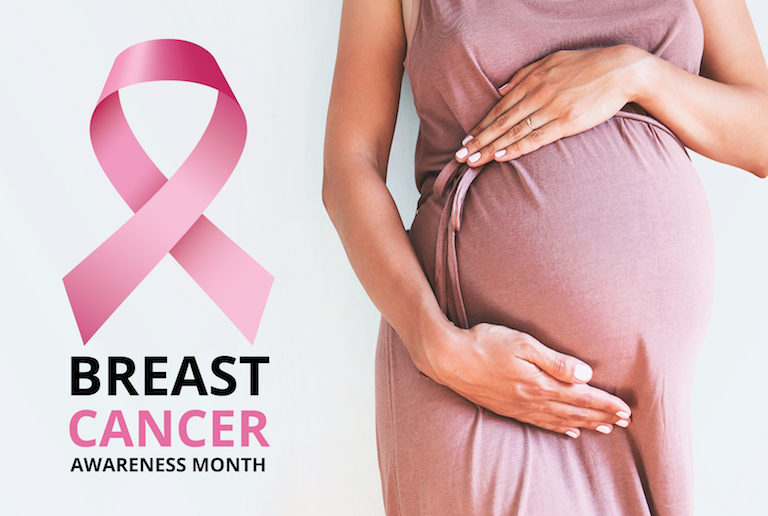You’ve survived breast cancer—that’s amazing! As you get ready for the next chapter of your life, you may be wondering about pregnancy after breast cancer. Here’s the good news: you can have a baby after breast cancer, and there are many options available to do so. You may be able to get pregnant naturally, with in-vitro fertilization (IVF) treatments, or via gestational surrogacy. Adoption is also an option. Here are a few common questions we hear from women who have had breast cancer, and are curious about pregnancy after cancer treatment.

Can I get pregnant after breast cancer?
Many women who have had breast cancer are able to get pregnant naturally, and recent studies have shown that having a child after breast cancer treatment does not seem to lower your chances for long-term survival. In fact, it may even increase survival rates.
Fertility after chemotherapy depends on your age, as well as the types and dosages of chemo medicine you received.
Generally, the younger you are, the greater your chances of becoming pregnant without IVF. Women who are under 30 have the highest fertility rates after breast cancer, and those who are closer to menopause, which usually starts around age 51, have the lowest fertility rates after cancer.
Women with lower doses of chemotherapy are also more likely to get pregnant after cancer treatment than those who received higher doses. Certain chemotherapy drugs, like Cytoxan, Platinol, and Adriamycin can increase risk of losing fertility. Other drugs, like methotrexate, fluorouracil and vincristine are less likely to cause infertility. For some newer drugs, like Taxol, Taxotere, and Abraxane, the effects on fertility are unknown.
I haven’t started cancer treatment yet. Is there anything I can do now to preserve my fertility?
For women who want to have children after breast cancer, there are several ways to preserve fertility before your treatments begin. Talk with your doctor, as well as a fertility specialist, before making treatment plans. Ask what your options are to increase fertility. You may choose to freeze an egg, store embryos before cancer treatment begins, or take medication to protect your ovaries from damage. The sooner you speak with a fertility specialist, the greater your chances are of preserving your fertility after cancer.

How long should I wait to get pregnant after cancer treatment?
If you get pregnant during your cancer treatment, or too soon afterward, the drugs in your system could harm the fetus. Chemotherapy patients are advised to wait at least six months before attempting to get pregnant. Depending on your treatment and the drugs you are taking, your doctor’s recommendations may vary, so it’s best to check with your doctor first.
Should I use IVF to increase my chances of getting pregnant?
IFV is an option for many women after breast cancer, but check with your doctor to make sure it is safe for you to take fertility medicine. If you have had hormone-sensitive cancer, there are medications you can take to reduce the amount of estrogen in your body during your fertility treatment. The costs of IVF should be considered, too. Your health insurance provider may be able to cover some of these expenses.
What if I can’t get pregnant after cancer treatment?
Women who are unable to get pregnant after cancer may wish to consider gestational surrogacy. With gestational surrogacy, an embryo is created via IVF, using the eggs and sperm of the intended parents or donors, and then transferred to a surrogate. The surrogate mother is not biologically related to the child she carries—but you, and/or your partner, may be, if you choose to donate your own eggs and/or sperm.
With gestational surrogacy, you may use your own eggs, or donor eggs, which can be fertilized with your partner’s sperm, or donor sperm. Gestational surrogacy is a great option for women who have frozen an egg or an embryo prior to their cancer treatment, or women who are able to get pregnant, but unable to carry the baby to term.
Interested in learning more about surrogacy for women with breast cancer?
At Newborn Advantage, we’re committed to helping clients achieve success in pregnancy after cancer treatment. We recognize and respect that your journey to motherhood may be different than someone else’s. But that doesn’t make it any less beautiful. If you’re interested in learning more about gestational surgery, give us a call or email us today to schedule a consultation. We look forward to hearing from you.



